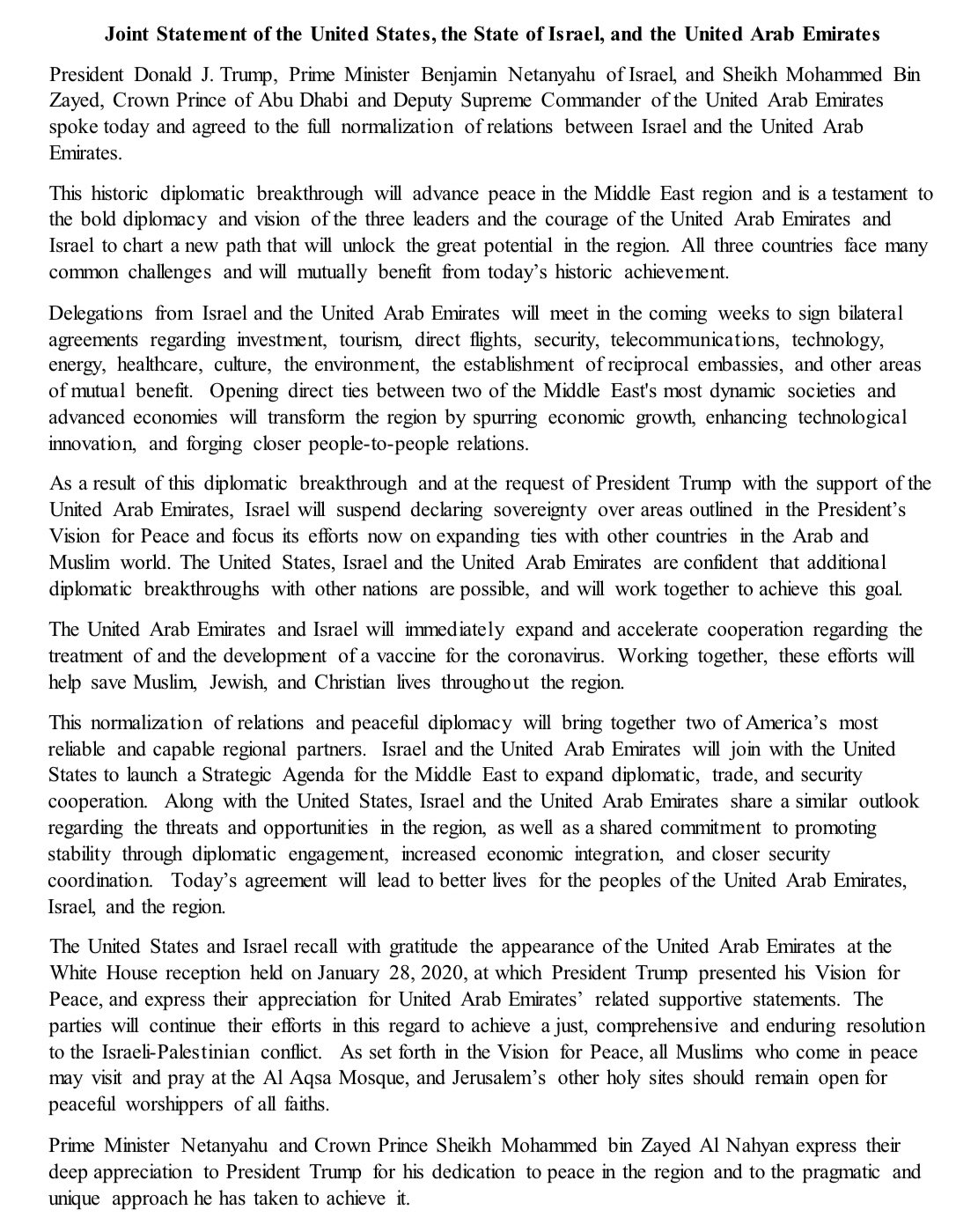
(Jerusalem, Israel) — Next Tuesday, September 1st, my Israeli, Palestinian and Lebanese colleagues and I will launch two new websites:
- ALL ISRAEL NEWS (www.allisrael.com), and
- ALL ARAB NEWS (www.allarab.news).
Given that both sites will be run by a new 501c3 non-profit organization, Near East Media, that we have set up in the U.S., both sites will be scrupulously non-partisan. I can promise you that we will endeavor to provide fair, honest, balanced coverage and analysis of events and trends in and affecting Israel and the Arab/Muslim world, as well as of the U.S. presidential campaign when the candidates deal with issues in our region.
—————————
Accepting the Republican nomination for President Thursday night, Donald Trump made his support for Israel, Middle East peace, and defeating radical Islamism a major theme of his Fall campaign.
Joe Biden made no direct mention of Israel or his approach towards the Middle East in his acceptance speech last week at the Democratic National Convention.
While his closest advisors and allies argue that Mr. Biden is not only the most pro-Israel Democrat ever nominated, and will have a more effective foreign policy strategy than Trump in the Middle East, the closest he came in his speech was an allusion to the region.
“I’ll be a President that will stand with our allies and friends and make it clear to our adversaries the days of cozying up to dictators is over,” Mr. Biden, the former Obama vice president, said. “Under President Biden, America will not turn a blind eye to Russian bounties on the heads of American soldiers. Nor will I put up with foreign interference in our most sacred democratic exercise: voting. And I’ll always stand for our values of human rights and dignity. I’ll work in common purpose for a more secure, peaceful and prosperous world.”
On the Biden campaign website, there is a section detailing his “friendship, support and action” for and towards Israel and the Jewish community over the years.
As I noted last week, Kamala Harris is more moderate on Israel than others in the Democratic Party, and is married to a pro-Israel Jewish lawyer.
Mr. Biden’s speech, however, focused almost entirely on domestic social and economic matters. Mr. Trump devoted several paragraphs of his speech to Israel and the Mideast.
“When I took office, the Middle East was in total chaos,” the President said. “ISIS was rampaging, Iran was on the rise, and the war in Afghanistan had no end in sight. I withdrew from the terrible, one-sided Iran Nuclear Deal.”
“Unlike many presidents before me, I kept my promise, recognized Israel’s true capital and moved our Embassy to Jerusalem,” Mr. Trump added. “But not only did we talk about it as a future site, we got it built. Rather than spending $1 billion on a new building as planned, we took an already owned existing building in a better location, and opened it at a cost of less than $500,000. We also recognized Israeli sovereignty over the Golan Heights, and this month we achieved the first Middle East peace deal in 25 years.”
He went on to say that “in addition, we obliterated 100 percent of the ISIS Caliphate, and killed its founder and leader Abu Bakr al-Baghdadi. Then, in a separate operation, we eliminated the world’s number one terrorist, Qassem Soleimani. Unlike previous administrations, I have kept America OUT of new wars – and our troops are coming home. We have spent nearly $2.5 trillion on completely rebuilding our military, which was very badly depleted when I took office. This includes three separate pay raises for our great warriors. We also launched the Space Force, the first new branch of the United States military since the Air Force was created almost 75 years ago.”
As the Fall campaign unfolds, it will be interesting to see how — and how much — the two candidates, their running mates, and their parties, deal with Israel, Iran, and other Mideast issues.
I promise to keep you posted.
(Photo credit: Getty Images and CNN)
—————————
- Would you like to make a secure, tax deductible donation to The Joshua Fund (www.joshuafund.net)? At this unprecedented moment of crisis, would you help us bless Israel and her neighbors in the name of Jesus, strengthen the Church in the Epicenter, care for the poor and needy and those unemployed and shut-in’s in Israel (both Jews and Arabs) with food and other humanitarian relief, teach the Word of God, answer spiritual questions, and strengthen struggling congregations and ministries in the Epicenter? The Joshua Fund is a member in good standing of the Evangelical Council for Financial Accountability. Please click here to learn more. Thanks.



















You must be logged in to post a comment.